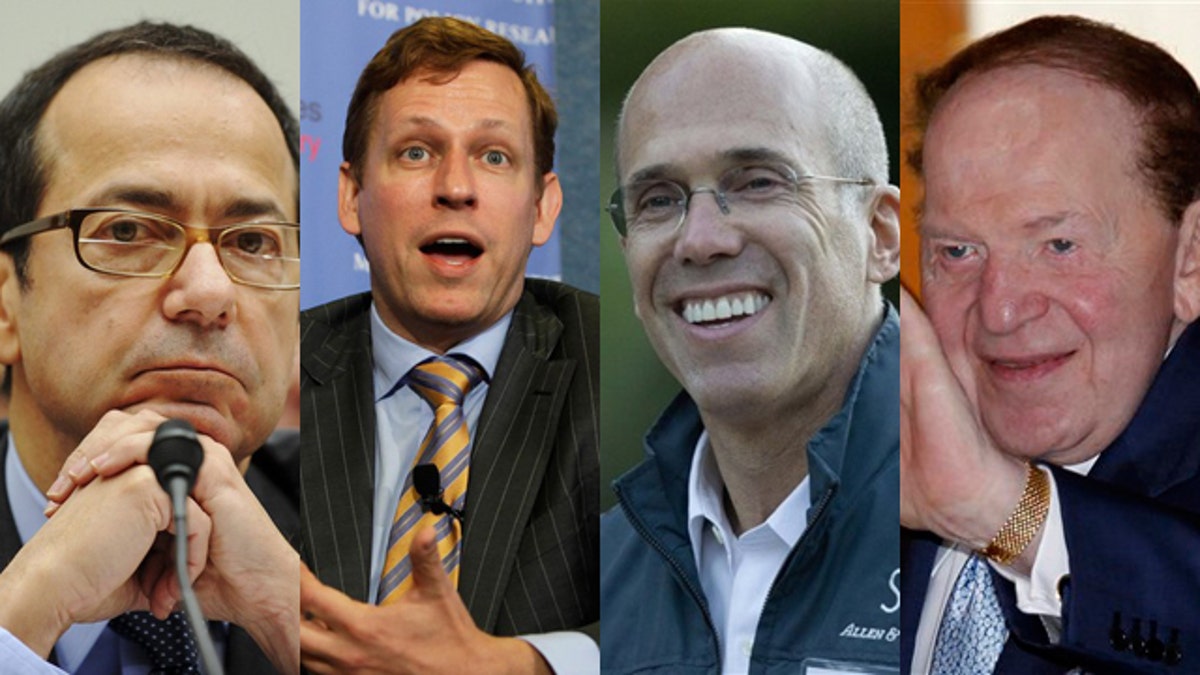Battle of the billionaires -- Super PACs offer chance for high rollers to sway 2012 race
{{#rendered}} {{/rendered}}
Shown here are supporters of 2012 candidate Super PACs. From left to right are: hedge fund investor John Paulson, PayPal co-founder Peter Thiel, DreamWorks executive Jeffrey Katzenberg, and casino magnate Sheldon Adelson. (AP/Reuters)
If the American presidential system were boiled down into a Las Vegas casino game, "Super PAC" betting would be placed exclusively in the high-stakes room.
The Super PAC system, a product of recent Supreme Court rulings, allows unlimited donations for political causes. And recent federal disclosure forms reveal the people behind them are the whales of the campaign trail -- putting up donations frequently in excess of a quarter-million dollars.
For the first time, voters are getting a glimpse at who's funding the previously opaque organizations boosting the presidential candidates' campaigns with outside spending.
{{#rendered}} {{/rendered}}Mitt Romney, not surprisingly, has a slew of investment titans -- including former colleagues at Bain Capital -- pumping money into the Super PAC supporting his campaign. Newt Gingrich enjoys high-powered support out of Vegas. Ron Paul is being indirectly funded by the co-founder of PayPal. Rick Santorum's Super PAC is backed mostly by two people. And President Obama's Super PAC is kept well-heeled by Hollywood and union support.
The nature of the donations is a world apart from the traditional campaign finance of presidential campaigns themselves -- for which individual donations are capped at $2,500.
In the world of Super PACs, $2,500 makes for a modest starting point. Donors routinely put up $100,000 and up in support of the campaign committee of their choice. And a relatively small number of high-dollar contributors are involved.
{{#rendered}} {{/rendered}}No Super PAC better exemplifies the unbound financial potential of the new system than Romney's group Restore Our Future.
According to end-of-year filings with Federal Election Commission, the pro-Romney committee has raised more than $30 million, from just 282 donors. The average donation tops $100,000, and the fund is backed by plenty of high-rollers.
At the top are donors like Robert Mercer, an executive at hedge fund firm Renaissance Technologies; John Paulson, president of hedge fund Paulson and Co.; Julian Robertson, founder of hedge fund Tiger Management; Paul Singer, founder of Elliott Management Corp.; and Edward Conard, a former Bain colleague. All put up $1 million apiece.
{{#rendered}} {{/rendered}}J.W. Marriott Jr., chairman of Marriott International, also contributed $500,000, as did Richard Marriott, chief of Marriott offshoot Host Hotels & Resorts.
By law, these campaign committees cannot coordinate with the presidential campaigns themselves or directly fund them. This catch explains why, when Romney and other candidates are challenged on Super PAC-funded ads, they note that their campaigns had nothing to do with the production.
But they are surely aware, and the Super PACs serve a blunt purpose.
{{#rendered}} {{/rendered}}According to a study by the Center for Responsive Politics, Restore Our Future has spent $17 million in opposition to Gingrich - in large part through advertising.
The other Super PACs don't have nearly as much money, but nevertheless serve as a potent tool for the candidates.
Winning Our Future, a pro-Gingrich group, has been backed by Texas businessman Harold Simmons. The group reported raising over $2 million at the end of the year, from just 18 people.
{{#rendered}} {{/rendered}}More recently, and subsequent to the 2011 filing period, Las Vegas casino magnate Sheldon Adelson drew headlines for putting up $5 million for the Gingrich Super PAC. His wife reportedly followed suit with another $5 million.
In Paul's corner is the Endorse Liberty group, which reported about $1 million raised for 2011. The group is supported almost exclusively by Peter Thiel, a hedge fund manager who co-founded PayPal.
Santorum's Red White and Blue Fund has raised slightly less than Paul's Super PAC. That, too, is backed by a handful of supporters, including wealthy investor Foster Friess and John Templeton Jr., son of philanthropist John Templeton.
{{#rendered}} {{/rendered}}And the pro-Obama Priorities USA Super PAC has raised a total of $4.4 million as of the end of 2011. About half of that came in the form of a $2 million donation from DreamWorks Animation CEO Jeffrey Katzenberg. Steven Spielberg also threw in $100,000.
Those five groups are just a slice of the national Super PAC pie, though they account for much of the money raised. According to the Center for Responsive Politics, 318 groups have raised nearly $99 million as of early February. They've spent nearly $47 million in the 2012 cycle.
The campaign finance free-for-all has raised pressing questions all along about whether the new system is a boon for free speech -- speech, that is, in the form of monetary donations and ads -- or a barrier for candidates who might not have the behind-the-scenes support of such wealth.
{{#rendered}} {{/rendered}}Gingrich, despite the support of his Las Vegas benefactors, has complained that the glut of negative advertising by Romney's supporters has damaged his candidacy.
In Congress, House Democratic Leader Nancy Pelosi and others are pushing for a new bill that would, among other provisions, require TV ads to name top donors.
Yet Obama's campaign this past week seemed to embrace the new Super PAC reality. The campaign said Obama officials would speak at Priorities USA events.
{{#rendered}} {{/rendered}}Romney reportedly has sanctioned the same kind of interaction.
FoxNews.com's Judson Berger contributed to this report.
